News
2024
Lourdes Moreno, appointed as an expert member of the IFIP TC13 (Technical Committee on Human-Computer Interaction).
Lourdes Moreno was appointed as an expert member of the International Federation for Information Processing Technical Committee on Human-Computer Interaction (IFIP TC13) in September 2023. IFIP stands as the most significant organization in the field of Information and Communication Technologies (ICT). Recognized by the United Nations and other global entities, it represents IT societies from 56 countries or regions, spanning all five continents with a membership exceeding half a million. This body brings together more than 3500 scientists from academia and industry, organized into over 101 working groups reporting to 13 technical committees. Its vast influence and international recognition establish it as the most authoritative and esteemed entity in the ICT world.
The IFIP-TC13 is the technical committee dedicated to advancing human-computer interaction (HCI) technology. Its primary aim is to encourage empirical research and to promote the application of knowledge and methods from the human sciences in the design and evaluation of computer systems. The committee strives to enhance the understanding of the relationship between formal design methods and the usability and acceptability of systems. Additionally, it is committed to developing guidelines, models, and methods that assist designers in creating more user-oriented and humanized computer systems.
Lourdes Moreno has been honored as an expert member, an accolade that, in conjunction with her role as president of the Human-Person Interaction Association (AIPO), positions her strategically. Her objective is to cultivate synergies between both organizations, conveying to the Spanish community the new approaches and methods being developed internationally. Simultaneously, she serves as a conduit to inform IFIP of the achievements and lines of work being pursued in Spain.
The main working groups of IFIP-TC13 are:
- Education in HCI and HCI Curriculum
- Methodologies for User-Centered Systems Design
- Human-Computer Interaction, Disability and Aging
- User Interface Engineering
- Human Error, Resilience, Reliability, Safety and System Development
- Human-Work Interaction Design group (HWID)
- Human-Computer Interaction & Visualization (HCIV)
- Interaction Design and International Development
- Interaction Design and Children
- Human-Centred Technology for Sustainability
Tesis Doctoral Weakly supervised Deep Learning for Natural Language Processing
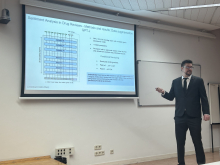 El pasado 21 de Diciembre, Cristóbal Colón-Ruiz defendió la tesis doctoral “Weakly supervised Deep Learning for Natural Language Processing”, dirigida por Isabel Segura-Bedmar, Profesora Titular del Departamento de Informática de la Universidad Carlos III de Madrid, miembro del grupo Hulat y vocal de la Sociedad IABIOMED.
Los recientes avances en procesamiento del lenguaje natural (PLN) se atribuyen a modelos de aprendizaje profundo, especialmente los transformers. Sin embargo, estos modelos requieren grandes cantidades de datos anotados, que son costosos de generar. La tesis aborda este desafío desarrollando métodos para PLN con pocos datos, empleando técnicas semi-supervisadas y modelos generativos. Estos métodos han mostrado resultados prometedores, especialmente en aplicaciones biomédicas, y podrían ser útiles en otros contextos de PLN pese a la limitación de datos.
El pasado 21 de Diciembre, Cristóbal Colón-Ruiz defendió la tesis doctoral “Weakly supervised Deep Learning for Natural Language Processing”, dirigida por Isabel Segura-Bedmar, Profesora Titular del Departamento de Informática de la Universidad Carlos III de Madrid, miembro del grupo Hulat y vocal de la Sociedad IABIOMED.
Los recientes avances en procesamiento del lenguaje natural (PLN) se atribuyen a modelos de aprendizaje profundo, especialmente los transformers. Sin embargo, estos modelos requieren grandes cantidades de datos anotados, que son costosos de generar. La tesis aborda este desafío desarrollando métodos para PLN con pocos datos, empleando técnicas semi-supervisadas y modelos generativos. Estos métodos han mostrado resultados prometedores, especialmente en aplicaciones biomédicas, y podrían ser útiles en otros contextos de PLN pese a la limitación de datos.
2023
Curso sobre Procesamiento de Lenguaje Natural con Aprendizaje Profundo
La profesora Isabel Segura Bedmar ha desarrollado un curso OCW para su asignatura de Procesamiento de Lenguaje Natural con Aprendizaje Profundo en el Máster de Ciencia y Tecnología Informática.
El curso proporciona una amplia colección de ejercicios y vídeos cortos que permitirá a los estudiantes que lo realicen conseguir un amplio conocimiento de las principales tareas y aplicaciones de PLN, así como de los principales modelos de aprendizaje profundo utilizados como soluciones de estas aplicaciones. Estos modelos abarcan desde las redes convolucionales y recurrentes, hasta los modelos transformers. Además, el curso también incluye un tema dedicado al tema de data augmentation para la generación de nuevas instancias sintéticas a partir de textos anotados para distintas tareas.
Es un curso con un enfoque muy práctico, que esperamos que resulte ameno y de utilidad para la comunidad de PLN.
Presentation of the Access2Citizen Project. Accessibility to the 112 emergency services.
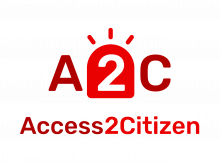 The "Royal Board on Disability of the Ministry of Social Rights", together with its consulting entity the "Spanish Center for Subtitling and Audio Description (CESyA)", managed by the "Universidad Carlos III de Madrid", has carried out the 'Access2Citizen' project with the objective of ensuring that telematic and telephone emergency services are accessible to people with sensory and cognitive disabilities.
The "Royal Board on Disability of the Ministry of Social Rights", together with its consulting entity the "Spanish Center for Subtitling and Audio Description (CESyA)", managed by the "Universidad Carlos III de Madrid", has carried out the 'Access2Citizen' project with the objective of ensuring that telematic and telephone emergency services are accessible to people with sensory and cognitive disabilities.
Publication of the article: "Designing user interfaces for content simplification aimed at people with cognitive impairments"
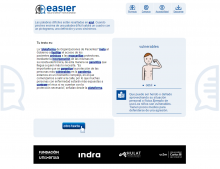 The article "Designing user interfaces for content simplification aimed at people with cognitive impairments" de Lourdes Moreno, Helen Petrie, Paloma Martínez y Rodrigo Alarcon has been published in the Journal Universal Access in the Information Society (UAIS). It results from a collaboration between the HULAT group and the researcher Helen Petrie from the University of York.
The article "Designing user interfaces for content simplification aimed at people with cognitive impairments" de Lourdes Moreno, Helen Petrie, Paloma Martínez y Rodrigo Alarcon has been published in the Journal Universal Access in the Information Society (UAIS). It results from a collaboration between the HULAT group and the researcher Helen Petrie from the University of York.
Participation of Lourdes Moreno in the "Artificial Intelligence and Accessibility Research Symposium" of the W3C, in the panel "Natural Language Processing for Accessible Communication"
Participation of Lourdes Moreno in the "Artificial Intelligence and Accessibility Research Symposium" of the W3C, in the panel "Natural Language Processing for Accessible Communication". On January 10 and 11, the "Artificial Intelligence (AI) and Accessibility Research Symposium" was held, within the framework of the W3C WAI initiative with the project "Communities of Practice (WAI-CooP) the W3C Accessible Platform Architectures (APA) Working Group”. This symposium brought together researchers to identify current challenges and opportunities posed by the increasing use of AI in relation to accessibility and to explore how ongoing research can leverage and improve accessibility.Hulat Group collaborates in the Guide "Curricular training in Accessibility and design for all in Technical Degrees related to ICT"
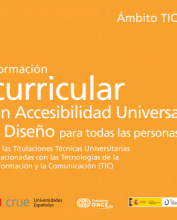
With the aim of improving the inclusion of accessibility and Design for All (DfA) in ICT university studies, the Royal Board on Disability and the ONCE Foundation have published the guide "Curricular training in Accessibility and Design for all people in Technical Degrees related to ICT“.
This guide guides teachers and professors in the design of subjects and the preparation of degree verification reports, and also as a reference for quality agencies and universities during the accreditation and quality assurance processes.
For the preparation of this guide, we have had the collaboration of expert professors in accessibility from the university, such as the case of Lourdes Moreno from the HULAT group of the UC3M Department of Computer Science.
In addition, as an example of good practices, the subject "Accessibility and design for all in software engineering" is included, in the Degree in Computer Science, from UC3M coordinated by Lourdes Moreno.
2022
"Navidad Accesible Madrid" app for people with disabilities
For the third consecutive year, the Madrid City Council, through the "Dirección General de Accesibilidad del Área de Obras y Equipamientos", together with the "Universidad Carlos III de Madrid", has made it possible for all people, especially those with visual and intellectual disabilities, to enjoy the traditional Christmas lights through the mobile application "Navidad Accesible Madrid".Paloma Martínez en la jornada “La transformación tecnológica al servicio de las personas: inclusión, diversidad e igualdad”
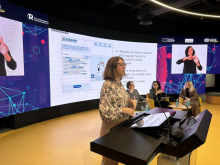 El día 25 de octubre Paloma Martínez participó en la jornada “La transformación tecnológica al servicio de las personas: inclusión, diversidad e igualdad” organizada por Nueva Economía de la Lengua, CERMI y Fundación ONCE en la que se habló de las oportunidades de las tecnologías del lenguaje para la inclusión, la diversidad y la igualdad en el marco del PERTE de la Nueva Economía de la Lengua.
El día 25 de octubre Paloma Martínez participó en la jornada “La transformación tecnológica al servicio de las personas: inclusión, diversidad e igualdad” organizada por Nueva Economía de la Lengua, CERMI y Fundación ONCE en la que se habló de las oportunidades de las tecnologías del lenguaje para la inclusión, la diversidad y la igualdad en el marco del PERTE de la Nueva Economía de la Lengua.
Published the article 'EASIER System. Evaluating a Spanish Lexical Simplification Proposal with People with Cognitive Impairments'.
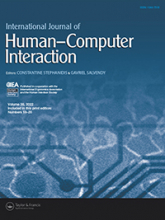 Written by Lourdes Moreno, Rodrigo Alarcon, Paloma Martínez, and Jose A. Macías, and published in the International Journal of Human-Computer Interaction in October 2022.
Written by Lourdes Moreno, Rodrigo Alarcon, Paloma Martínez, and Jose A. Macías, and published in the International Journal of Human-Computer Interaction in October 2022.
